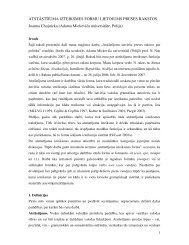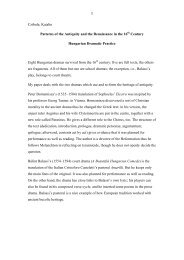Amir Weiner Getting to Know You
Amir Weiner Getting to Know You
Amir Weiner Getting to Know You
You also want an ePaper? Increase the reach of your titles
YUMPU automatically turns print PDFs into web optimized ePapers that Google loves.
34 AMIR WEINER AND AIGI RAHI-TAMM<br />
The unreliability of a large portion of the gathered information was<br />
augmented by the questionable reliability of those who solicited and<br />
processed it. By the late Stalinist era, this turned in<strong>to</strong> a thorny issue<br />
and triggered a drive for improved professional standards. Following unionwide<br />
MGB decrees on 10 January and 10 April 1952, regional branches of<br />
the organization were subjected <strong>to</strong> drastic cuts in personnel and recruitment<br />
procedures were thoroughly reorganized. The key categories of “agent” and<br />
“informant” were replaced by “agent” and “special agent,” respectively,<br />
and could be recruited only by heads of departments. Rank-and-file<br />
operatives who had hither<strong>to</strong> played a major role in recruitment were limited<br />
<strong>to</strong> the preparation of material on the new recruits. 93<br />
Within two months, the Lithuanian branch was reduced by 65.6<br />
percent, from 27,711 agents, informants, and residents <strong>to</strong> 9,517 people. The<br />
agency’s own analysis pointed <strong>to</strong> serious deficiencies. Some 1,054 agents and<br />
informants were dismissed on grounds of double-dealing, misinformation,<br />
and violation of secrecy. The rest simply appeared <strong>to</strong> be useless and redundant.<br />
Like so many other Soviet institutions, the security forces were plagued by the<br />
urge <strong>to</strong> keep up appearances and fulfill quotas. Some agents were employed<br />
regardless of having been exposed by fellow kolkhozniks who complained<br />
that “[the agents] did not fulfill their work norms because they were busy<br />
with secret cooperation with the MGB organs.” Others who were unqualified<br />
or had criminal records were kept in the surveillance network since “there<br />
was no surveillance in the kolkhoz where they worked and they are needed in<br />
any case.” Scores of informants who at least on paper looked like promising<br />
prospects for valuable information on the old intelligentsia and national<br />
minorities were kept on the rosters despite offering no information and<br />
avoiding meetings with their handlers over several years. In some cases, they<br />
refused flat out <strong>to</strong> work for the organization or threatened suicide if they were<br />
not left alone. Hence, for example, after four futile years the MGB had <strong>to</strong><br />
release the private physician of Antanas Sme<strong>to</strong>na, the interwar Lithuanian<br />
president, who was also a driving force behind the French-Lithuanian Society.<br />
The person, identified as informant “Iusupov” flatly refused <strong>to</strong> offer any<br />
information from the moment of his recruitment in 1948.<br />
The MGB concluded that the purge marked a significant improvement<br />
in its work. Having been saddled with <strong>to</strong>o many agents and informants and<br />
93 Chebrikov, Is<strong>to</strong>riia, 460–61. Notably, the police agencies pursued these reforms<br />
simultaneously <strong>to</strong> its (futile) flirtation with reforms of the Gulag as a whole, turning it in<strong>to</strong><br />
an economically more effective enterprise. See Aleksei Tikhonov, “The End of the Gulag,”<br />
in The Economics of Forced Labor: The Soviet Gulag, ed. Paul Gregory (Stanford, CA: Hoover<br />
Institution Press, 2003), 67–73.

















